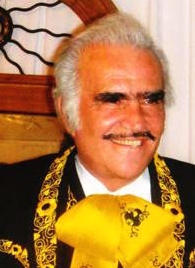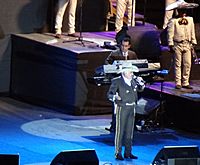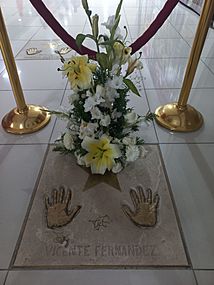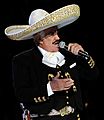Vicente Fernández facts for kids
Quick facts for kids
Vicente Fernández
|
|
|---|---|
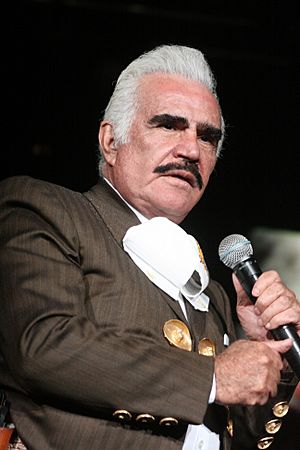 |
|
| Born |
Vicente Fernández Gómez
17 February 1940 |
| Died | 12 December 2021 (aged 81) Guadalajara, Jalisco, Mexico
|
| Burial place | Rancho Los Tres Potrillos, Tlaquepaque, Jalisco, Mexico |
| Other names |
|
| Occupation |
|
| Years active | 1966–2016 |
| Children | 4, including Alejandro Fernández |
| Musical career | |
| Genres |
|
| Instruments |
|
| Labels |
|
| Signature | |
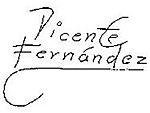 |
|
Vicente Fernández Gómez (born February 17, 1940 – died December 12, 2021) was a famous Mexican singer, actor, and film producer. He was known for his amazing voice in ranchera songs. Vicente started by singing on the streets and became a huge star. He recorded over 100 albums and appeared in more than 30 movies.
Vicente Fernández won many awards, including four Grammy Awards and nine Latin Grammy Awards. He also has a star on the Hollywood Walk of Fame. He sold over 50 million records worldwide. This made him one of the most successful Mexican artists ever. In 2016, he stopped performing live concerts. However, he kept recording new music. In 2023, Rolling Stone magazine called him the greatest Mexican singer of all time.
Contents
Early Life & First Songs
Vicente Fernández was born on February 17, 1940. He grew up in a small village called Huentitán El Alto in Jalisco, Mexico. His father was a rancher, and his mother was a housewife. When he was a young boy, around 6 or 7 years old, he loved watching movies. He especially enjoyed films with famous singers like Pedro Infante and Jorge Negrete. Vicente told his mother he wanted to be like them when he grew up.
His family had a hard time making enough money. So, after he finished elementary school, they moved to Tijuana. As a teenager, Vicente worked many different jobs. He was a bricklayer, a painter, and even a cabinetmaker. He always sang while he worked. Many construction companies liked to hire him because of his singing. Later, he worked as a cashier in his uncle's restaurant.
At 14, he started singing in restaurants and at weddings. He joined several mariachi groups. One of these was Mariachi Amanecer de Pepe Mendoza. He also sang on a radio show called Amanecer Tapatío. This helped him become known in his local area.
In 1965, Vicente moved to Mexico City. He wanted to become a big music star. At first, record companies were not interested in him. But he got a chance to sing on a radio station called XEX-AM. This was the most important radio station in Mexico at the time. In April 1966, he finally started getting offers to record albums.
Becoming a Star: The 1970s and 1980s
It took about ten years for Vicente Fernández to become truly famous. His albums like La voz que estabas esperando and El rey sold millions of copies.
In 1976, his song Volver Volver made him a huge star. This song was written in 1972 by Fernando Z. Maldonado. It became very popular across Mexico and all of North and South America.
In the 1980s, Vicente's music style changed. He started singing more about people moving to new places.
In 1983, he released 15 Grandes con el Numero Uno. This was his first album to sell over one million copies.
In 1987, he went on his first international tour. He performed in Bolivia and Colombia.
Musical Success in the 1990s
By 1991, newspapers in the U.S. were calling Vicente Fernández the "Mexican Sinatra". He released many classic ranchera songs during this time. Some famous ones include Las clásicas de José Alfredo Jiménez (1990) and Lástima que seas ajena (1993). Other hits were Aunque me duela el alma (1995), Mujeres divinas, and Acá entre nos. Songs like Me voy a quitar de en medio (1998) and La mentira (1998) also became classics.
The 2000s and Early 2010s
In 2001, Vicente went on a tour called Lazos Invincibles with his son Alejandro. In 2006, he released the album La tragedia del vaquero. This album sold so well that it was certified platinum in the United States.
He won another Latin Grammy in 2008 for his album Para Siempre, released in 2007. In 2008, he released Primera Fila. This album was a huge success. It was certified double platinum in Mexico and platinum in other countries. It stayed at number one on Billboard charts for seven weeks. This album also won him another Latin Grammy for Best Ranchero Album.
On February 14, 2009, Vicente performed a concert at the Zócalo in Mexico City. Almost 220,000 people came to see him. This broke attendance records. That same year, he released Necesito de ti. This album won a Grammy and a Latin Grammy the next year. In September 2010, he released El Hombre Que Más Te Amó, which he produced himself. It also won a Latin Grammy. In November 2011, he released Otra vez, another album he produced.
After the 2010 Haiti earthquake, Vicente was one of 50 Latin singers who sang "Somos El Mundo 25 Por Haiti". This was a charity song to help Haiti.
Vicente Fernández opened the 2011 Pan American Games in Guadalajara. He sang "México Lindo y Querido" and "Guadalajara". Later, he sang the Mexican national anthem. In October 2011, he signed a deal with Budweiser. This deal helped provide scholarships for Hispanic American students.
Later Years & Retirement
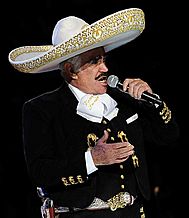
On February 8, 2012, Vicente Fernández announced he would retire from performing. Two months later, he released Los 2 Vicentes with his son Vicente Jr. This album included the theme song for a TV show called Amor bravío.
That same year, he recorded "Return to me" with Tony Bennett. This song was for Bennett's album Viva Duets. Vicente also released the album Hoy in 2012. It won a Latin Grammy in 2013. He then released Mano a mano, tangos a la manera de Vicente Fernández in 2014. This album won him his second Grammy for Best Regional Mexican Album. His album "Muriendo de amor" came out in 2015.
On November 28, 2013, Vicente released his book, Pero sigo siendo el rey. The book shared stories and over 200 never-before-seen photos from his career.
His farewell concert was called "Un azteca en el Azteca". It happened on April 16, 2016, at the Estadio Azteca. Over 80,000 people came to the free concert. He sang more than 40 songs for over four hours. It was the longest concert of his career. His only special guest was his son Alejandro. This concert was also released as an album. It won a Grammy Award in 2017.
Even after retiring from the stage, he continued to record music. He released Más romántico que nunca in 2018. In 2020, he released A mis 80s. This album earned him his ninth Latin Grammy Award in 2021.
Acting Career
Vicente Fernández first appeared in a movie in 1971. It was called Tacos al carbón. He starred in his first film, La ley del monte, in 1976. Over 20 years, he starred in 30 movies. Many of these were directed by Rafael Villaseñor Kuri. He acted alongside famous Mexican actors like Blanca Guerra and Lucía Méndez.
In his movies, he often introduced his songs. So, the movie title would often be the same as the song title. He usually played the role of a strong, charming Mexican man.
He also worked as a film producer. His first movie as a producer was El hijo del pueblo in 1974. His last movie was Mi querido viejo in 1991. After that, he focused only on his music career.
Personal Life
Vicente Fernández married María del Refugio Abarca, also known as "Cuquita," on December 27, 1963. She was the sister of a close friend he knew from his hometown. They had three sons: Vicente Jr., Gerardo, and Alejandro. They also adopted their niece, Alejandra. From their children, they had 11 grandchildren and 5 great-grandchildren.
Death
Vicente Fernández was hospitalized on August 6, 2021. This happened after he fell at his ranch in Guadalajara. He passed away on December 12, 2021, at 81 years old. His death was due to complications from his injuries. President of Mexico Andrés Manuel López Obrador shared his sadness on Twitter. He called Vicente a "symbol of the ranchera song of our time."
Vicente Fernández was buried in a special place on his ranch.
Interesting Facts About Vicente Fernández
- In his 50-year career, he sold over 65 million records. He recorded more than 80 albums and over 300 songs.
- Vicente learned to play the guitar when he was 8 years old.
- At 21, he appeared on a TV show called La calandria musical. This was his first paid performance.
- His song Volver volver was covered by more than twenty other singers. These included Chavela Vargas and Nana Mouskouri.
- Vicente built his ranch, "Los 3 Potrillos," in the 1990s. It became his music production center.
- In 1998, his oldest son, Vicente Jr., was taken by kidnappers. Vicente Sr. paid money to get him back. His son was returned 121 days later. The kidnappers were later sentenced to 50 years in prison in 2008.
- In 2012, the city of Chicago gave Vicente Fernández the key to the city. They also renamed West 26th Street in the Little Village neighborhood after him. Chicago also celebrates "Vicente Fernandez Week" every year from October 20 to 27.
- Vicente Fernández had several nicknames. These included "Chente" (a short form of Vicente), "El Charro de Huentitán" (The Charro from Huentitán), "El Ídolo de México" (The Idol of Mexico), and "El Rey de la Música Ranchera" (The King of Ranchera Music).
Awards and Honors
In 1990, Vicente Fernández released Vicente Fernandez y las clásicas de José Alfredo Jiménez. This album honored José Alfredo Jiménez, a famous Mexican songwriter. Vicente won the Billboard Latin Music Award for Mexican Regional Male Artist of the Year five times.
In 1998, Vicente was added to Billboard's Latin Music Hall of Fame. On November 11, 1998, his star was placed on the Hollywood Walk of Fame.
In 2002, the Latin Recording Academy honored Vicente as Person of the Year. That year, he celebrated 35 years in music. He had sold over 50 million records. He was also added to the International Latin Music Hall of Fame. He has 51 albums recognized by the RIAA for selling many copies.
There is also an arena in Guadalajara named after him. His company built it in 2005. He also has his handprints and name at the Paseo de las Luminarias in Mexico City. On July 16, 2008, the Governor of New Mexico, U.S., Bill Richardson, declared June 12 as Vicente Fernández Day. In 2010, Vicente won his first Grammy Award for Best Regional Mexican Album for his record Necesito de Tí.
On October 6, 2019, a statue of Vicente Fernández was unveiled in Guadalajara. It is located at the "Plaza de los Mariachis."
Grammy Awards
The Grammy Awards are given out every year in the United States. Vicente Fernández won four Grammys from fourteen nominations.
| Year | Nominee / work | Award | Result |
|---|---|---|---|
| 2010 | Necesito de Tí | Best Regional Mexican Album | Won |
| 2015 | Mano a Mano – Tangos a la Manera de Vicente Fernández | Best Regional Mexican Music Album (including Tejano) | Won |
| 2017 | Un Azteca En El Azteca, Vol. 1 (En Vivo) | Best Regional Mexican Music Album (including Tejano) | Won |
| 2022 | A Mis 80's | Best Regional Mexican Music Album (including Tejano) | Won |
Latin Grammy Awards
The Latin Grammy Awards are given out every year in the United States. Vicente Fernández won eight awards from fourteen nominations. He was also named Latin Recording Academy Person of the Year.
| Year | Nominee / work | Award | Result |
|---|---|---|---|
| 2002 | Más Con El Número Uno | Best Ranchero Album | Won |
| 2003 | 35 Aniversario – Lo Mejor de Lara | Won | |
| 2004 | En Vivo Juntos Por Ultima Vez (shared with Alejandro Fernández) | Won | |
| Se Me Hizo Tarde la Vida | Nominated | ||
| 2008 | Para Siempre | Won | |
| 2009 | Primera Fila | Won | |
| 2010 | Necesito de Ti | Won | |
| 2011 | El Hombre Que Más Te Amó | Won | |
| 2013 | Hoy | Won | |
| 2021 | A mis 80's | Won |
Lo Nuestro Awards
The Lo Nuestro Awards honor the best Latin music. Vicente Fernández won fourteen awards from thirty-three nominations.
| Year | Nominee / work | Award | Result |
|---|---|---|---|
| 1989 | Himself | Regional Mexican Artist | Won |
| 1990 | Himself | Regional Mexican Artist | Won |
| "Por Tu Maldito Amor" | Regional Mexican Song of the Year | Won | |
| 1991 | Himself | Regional Mexican Artist | Won |
| 1992 | Himself | Regional Mexican Male Artist of the Year | Won |
| 1993 | Himself | Regional Mexican Male Artist | Won |
| 2003 | Himself | People's Internet Choice Award: Regional Mexican | Won |
| 2006 | Himself | Ranchera Performance | Won |
| 2007 | Himself | Ranchera Performance | Won |
| 2008 | Himself | Excellence Award | Won |
| 2009 | Himself | Regional Mexican Male Artist | Won |
| Himself | Ranchera Performance | Won | |
| 2010 | Himself | Ranchera Performance | Won |
| 2014 | Himself | Ranchera Performance | Won |
Other Honors
- Orden Libertadores y Libertadoras de Venezuela (Venezuela, 2012)
Filmography
Here are some of the movies Vicente Fernández starred in:
- 1991: Mí Querido Viejo (My Dear Old Man)
- 1990: Por Tu Maldito Amor (For Your Damned Love)
- 1987: El Cuatrero (The Rustler)
- 1987: El Diablo, el Santo y el Tonto (The Devil, the Saint, and the Fool)
- 1987: El Macho (The Tough One)
- 1987: El Embustero (The Liar)
- 1985: Entre Compadres Te Veas (You Find Yourself Among Friends)
- 1985: Sinvergüenza Pero Honrado (Shameless But Honorable)
- 1985: Acorralado (Cornered)
- 1985: Matar o Morir (Kill or Die)
- 1983: Un Hombre Llamado el Diablo (A Man Called the Devil)
- 1982: Juan Charrasqueado & Gabino Barrera
- 1981: Una Pura y Dos Con Sal (One Pure and Two with Salt)
- 1981: El Sinverguenza (The Shameless One)
- 1981: Todo un Hombre (Fully Manly)
- 1980: Como Mexico no Hay Dos (Like Mexico There Is No Other)
- 1980: Picardia Mexicana Numero Dos (Mexican Rogueishness Number Two)
- 1980: Coyote and Bronca (The Coyote and the Problem)
- 1979: El Tahúr (The Gambler)
- 1977: Picardia Mexicana (Mexican Rogueishness)
- 1977: El Arracadas (The Earringer)
- 1975: Dios Los Cria (God Raises Them)
- 1974: Juan Armenta: El Repatriado (Juan Armenta: The Repatriated One)
- 1974: El Albañil (The Bricklayer)
- 1974: La Ley del Monte (The Law of Wild)
- 1974: Entre Monjas Anda el Diablo (The Devil Walks Between Nuns)
- 1974: El Hijo del Pueblo (Son of the People)
- 1973: Tu Camino y el Mio (Your Road and Mine)
- 1973: Uno y Medio Contra el Mundo (One and a Half Against the World)
- 1971: Tacos Al Carbón (Grilled Tacos)
Images for kids
See also
 In Spanish: Vicente Fernández para niños
In Spanish: Vicente Fernández para niños
 | Roy Wilkins |
 | John Lewis |
 | Linda Carol Brown |


